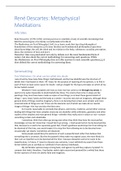René Descartes: Metaphysical
Meditations
Info Sites
René Descartes’ (1596-1650) central goal was to establish a body of scientific knowledge that
held the same degree of certainty as mathematical truths.[1]
The Meditations on First Philosophy (1641) is a classic work that lays the philosophical
foundations of this enterprise.[2] It raises timeless and fundamental philosophical questions
about knowledge, the self, the mind and its relation to the body, substance, causality, perception,
ideas, the existence of God, and more.
Descartes’ time was punctuated not only by debate over the most fundamental facts of
nature, but also about the correct methodology for answering such questions. While
the Meditations on First Philosophy does not offer answers to such scientific questions,[11] it
does defend the correct methodology for answering them.
Samenvatting
First Meditation: On what can be called into doubt
I was struck by how many false things I had believed, and by how doubtful was the structure of
beliefs that I had based on them. All I need, for the purpose of rejecting all my opinions, is to find in
each of them at least some reason for doubt. I will go straight for the basic principles on which all my
former beliefs rested:
Whatever I have accepted until now as most true has come to me through my senses. It
seems to be quite impossible to doubt beliefs like these. The visions that come in sleep are like
paintings: they must have been made as copies of real things; so at least these general kinds of
things— eyes, head, hands and the body as a whole—must be real and not imaginary. although these
general kinds of things could be imaginary, there is no denying that certain even simpler and more
universal kinds of things are real. These are the elements out of which we make all our mental
images of things—the true and also the false ones.
So it seems reasonable to conclude that physics, astronomy, medicine, and all other sciences
dealing with things that have complex structures are doubtful; while arithmetic, geometry and other
studies of the simplest and most general things—whether they really exist in nature or not—contain
something certain and indubitable.
I sometimes think that others go wrong even when they think they have the most perfect
knowledge; so how do I know that I myself don’t go wrong. -> God would not let me be deceived like
that, because he is said to be supremely good. But, if God’s goodness would stop him from letting me
be deceived all the time, you would expect it to stop him from allowing me to be deceived even
occasionally; yet clearly I sometimes am deceived.
Some people would deny the existence of such a powerful God rather than believe that
everything else is uncertain. But the less powerful they make my original cause, the more likely it is
that I am so imperfect as to be deceived all the time—because deception and error seem to be
imperfections. In future, if I want to discover any certainty, I must withhold my assent from these
former beliefs just as carefully as I withhold it from obvious falsehoods.
My old familiar opinions keep coming back, and against my will they capture my belief. To
conquer that habit, therefore, I had better switch right around and pretend (for a while) that these
former opinions of mine are utterly false and imaginary.





